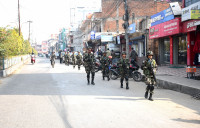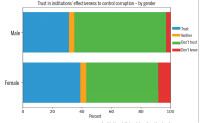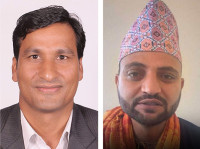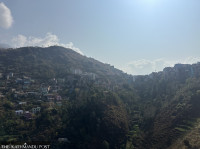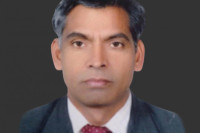National
No barrier to Nepal prime minister’s India visit, Oli says after talks with Modi
Says the government is busy with Sagarmatha Sambad preparations while also eyeing his Delhi tour by mid-May.
Post Report
Prime Minister KP Sharma Oli, who has been looking to go on a visit to India since assuming office in July last year, said that his tour of the southern neighbour could come ahead of the Sagarmatha Sambad, Nepal’s first-ever global dialogue scheduled for May 16-18.
Speaking with reporters at Tribhuvan International Airport upon his arrival from Bangkok after participating in the sixth summit of the Bay of Bengal Initiative for Multi-Sectoral Technical and Economic Cooperation (Bimstec), Oli said there’s no “barbed wire” barrier on his way to India.
Ending a logjam in the top-level political relationship between the two countries, Oli on Friday held talks with Indian Prime Minister Narendra Modi in Bangkok on the sidelines of the Bimstec Summit. The one-on-one meeting is said to have created a positive atmosphere for his India visit by dispelling negative notions believed to be constraining the ties.
Both Oli and Modi also reportedly discussed several other contemporary issues during their 35-minute-long talk.
Oli clarified that his India visit is not impossible. In response to a journalist’s question of when his much-awaited India visit is taking place, Oli said, “For certain reasons, it hasn’t been possible so far. Sometimes, there are specific circumstances that prevent it. The situation is not as it is seen from outside. No one has set up fences to stop a visit to India.”
The Indian side has not come up with details about the meeting between Oli and Modi but some Indian media outlets stated that Modi had assured Oli that India is committed to supporting democracy in Nepal.
Citing people familiar with the meeting, Hindustan Times, a leading Indian newspaper, reported: “The assurance assumes significance against the backdrop of Oli’s reported concerns about possible Indian involvement in recent violent pro-monarchy protests in Kathmandu and other cities that resulted in two fatalities and significant damage to property.”
The Hindustan Times further said: “The people cited above said on condition of anonymity that Modi and Oli held a one-on-one meeting without any aides present so that there could be a frank discussion between the leaders. During the talks, Modi made it clear that India is committed to democracy in Nepal, the people said.”
After the meeting, Modi said he had ‘productive’ talks with Prime Minister Oli. “Had a productive meeting with Prime Minister KP Sharma Oli in Bangkok. India attaches immense priority to relations with Nepal,” Modi wrote on X after the meeting. “We discussed different aspects of India-Nepal friendship, especially in sectors like energy, connectivity, culture and digital technology,” he said.
Responding to journalists’ queries in Kathmandu on Saturday, Oli also denied reports that his meeting with Modi in New York on the sidelines of the United Nations General Assembly had ended on a sour note.
“We had a conversation in September. As you mentioned, there was nothing bad at that time. There was nothing negative. Why some called it a failure I do not know,” Oli said. “This time, there was more discussion, much more in the context of mutual cooperation in areas including our investment and trade sectors, issues like Pancheshwar and irrigation from Mahakali River in Dodhara-Chandani.”
Some in Kathmandu predicted that Oli's premiership would fail as he was unable to undertake a visit to India. But he rubbished such allegations. Stating that the government is busy preparing for the Sagarmatha Sambad, he said the visit could happen ahead of Nepal’s climate dialogue if the two countries arrange it. Oli said, “We are a little busy since we are holding the Sagarmatha Sambad. But if we have time, it could happen before that.”
During the Bimstec Summit, the Nepali side invited all heads of states and governments to attend the Sagarmatha Sambad and discuss issues of climate change.
Oli said that during his meeting with Modi, they held extensive discussions on various areas of mutual interest. The prime minister said there was a discussion on resolving bilateral issues through dialogue. According to him, the discussions with Modi covered issues of bilateral cooperation, investment, and trade.
“There has been extensive conversation on areas of mutual interest. We have made a commitment to further broaden, expand, and strengthen Nepal-India relations. Any issue that arises in the neighbourhood can be resolved through talks,” said Oli.
The prime minister said that Modi will not attend the Sagarmatha Sambad. He stated that although Nepal had requested Modi to participate in the event, the Indian prime minister has a visit to Europe coinciding with Nepal’s flagship dialogue. However, a high-ranking official from India would attend the event in Kathmandu.
“Since that programme [Europe visit] has already been set, he informed us of his inability to come,” said Oli.
India’s Ministry of External Affairs said that the two leaders reviewed the “unique and close relationship” between India and Nepal. They expressed satisfaction at the progress in enhancing physical and digital connectivity, people-to-people linkages, and in the domain of energy. They agreed to continue working towards deepening the multifaceted partnership between the two countries and peoples.
‘We will probe Tinkune incident’
Prime Minister Oli also indicated that the government will impartially probe the Tinkune incident in which two youths were killed during a protest called by the pro-monarchy groups on March 28.
“We will conduct an impartial probe into the incident,” said Oli. “Not every case needs a judicial probe but the government will investigate it.”
Some lawmakers of his own party, the CPN-UML, have refused to carry out any probe into the incident where pro-monarchy demonstrators torched private and public houses, properties, vehicles, party offices, media houses and even looted a supermarket.
The Rastriya Prajatantra Party, which demands restoration of Hindu Kingdom, and some other stakeholders have demanded a judicial probe into the incident. While the protesters are accused of resorting to violent acts such as vandalism, arson and looting, security agencies are also blamed for using excessive force while failing to take the situation under control.




 22.26°C Kathmandu
22.26°C Kathmandu